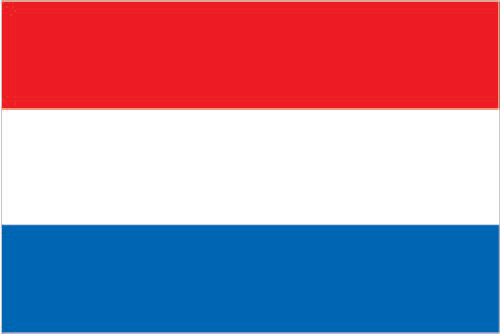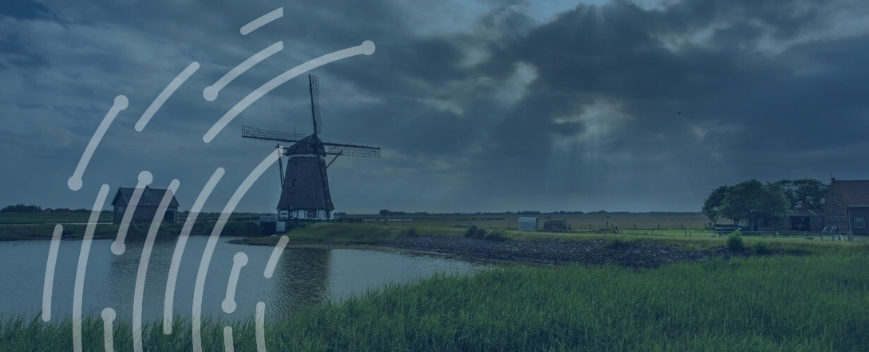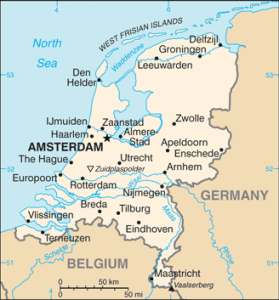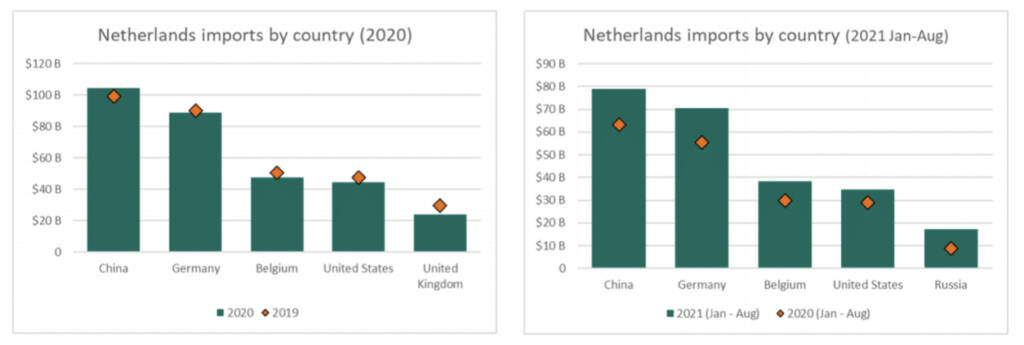Exporting to Netherlands


Netherlands Country Profile
Official Name (Local Language) Koninkrijk der Nederlanden
Capital Amsterdam
Population 17,016,967
Currency Euro
GDP $773.9 billion
Languages Dutch, Eastern Frisian
Telephone Dial In 31
Netherlands Imports Profile
Imports ($m USD) 450,076
Number of Imports Products 4,501
Number of Imports Partners 225

Netherlands Economic Statistics
Government Website | https://www.overheid.nl/ |
| Sovereign Ratings | https://countryeconomy.com/ratings/netherlands |
| Central Bank | De Nederlandsche Bank |
| Currency USD Exchange Rate | 0.9214 |
| Unemployment Rate | 6% |
| Population below poverty line | 8.8% |
| Inflation Rate | 0.3% |
| Prime Lending Rate | 0% |
| GDP | $773.9 billion |
| GDP Pro Capita (PPP) | $50,800 |
| Currency Name | Euro |
| Currency Code | EUR |
| World Bank Classification | High Income |
| Competitive Industrial Performance | 4/138 |
| Corruption Perceptions Index | 8/180 |
| Ease of Doing Business | 36/190 |
| Enabling Trade Index | 2/136 |
Access trade, receivables and supply chain finance
We assist companies to access trade and receivables finance through our relationships with 270+ banks, funds and alternative finance houses.
Get StartedExporting to the Netherlands
The Netherlands is a densely populated nation of 17 million inhabitants on the Northwestern coast of Europe.
International trade is a critical aspect of the Dutch economy, comprising 77.9% of the nation’s GDP.
The Netherlands’ 2019 import flows exceeded $514 billion, with imports primarily coming from Germany, Belgium, China, USA, and Ireland.
While the Netherlands as a whole is heavily involved in international trade, the bulk of trade volume is conducted by the nation’s larger firms.

The Netherlands appears to be very comfortable with digitalisation and the notion of digital banking.
Notably, SMEs in the Netherlands rank in the upper range of their OECD counterparts on all aspects of digital readiness.
Exporting to the Netherlands: What is trade finance?
Trade finance is a revolving facility which lenders offer – it enables businesses to purchase stock supplies and can help ease working capital issues.
Typically, a trade financier will fund up to 100% of the cost of the products, including charges (e.g. VAT taxes).
Trade finance offers benefits over more traditional bank finance such as invoice finance or business loans.
Businesses are provided quick funding without it affecting existing relationships with banks.
If a company is importing or exporting stock worldwide, then a trade finance facility would help fund this by offering a letter of credit or some form of cash advance.
If an enterprise is looking to export inventory to other markets, it may require export finance, which is an agreement between the exporter and the importer.
A trade finance bank would advance the cost of producing the stock supplies that are being exported (as a loan), either once the goods have been sent, or before they have been produced.
Once a foreign importer has received the stock and pays for the import, the advance loan will then be repaid from the export lender over an agreed period.
Chart Showing GDP Growth Compared to rest of world
GDP Composition for Netherlands
Agriculture
1.6%
Vegetables, ornamentals, dairy, poultry and livestock products; propagation materials
Industry
17.8%
Agroindustries, metal and engineering products, electrical machinery and equipment, chemicals, petroleum, construction, microelectronics, fishing
Services
70.4%
Map
Top 5 Imports Partners
| Country | Trade | % Partner Share |
| Germany | 83,106 | 18.47 |
| Belgium | 48,176 | 10.70 |
| China | 40,594 | 9.02 |
| United States | 34,436 | 7.65 |
| United Kingdom | 24,011 | 5.33 |
Top 5 Imports Products
| Export Product | Number |
| Petroleum oils, etc, (excl. crude); preparation | 6.3% |
| Petroleum oils and oils obtained from bituminou | 6.3% |
| Transmission apparatus, for radioteleph incorpo | 4.5% |
| Parts and accessories of automatic data process | 4.2% |
| Other medicaments of mixed or unmixed products, | 2.2% |
Local Authors
Local Partners
- All Topics
- Netherlands Trade Resources
- Export Finance and ECA Topics
- Local Conferences
























